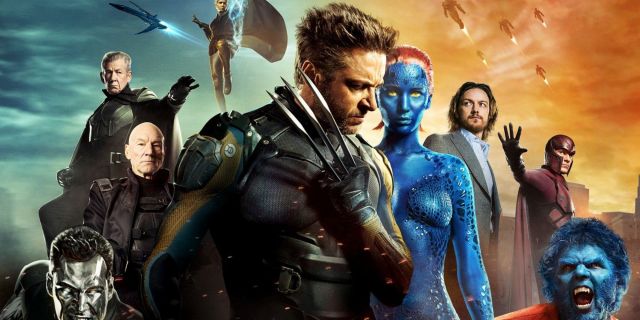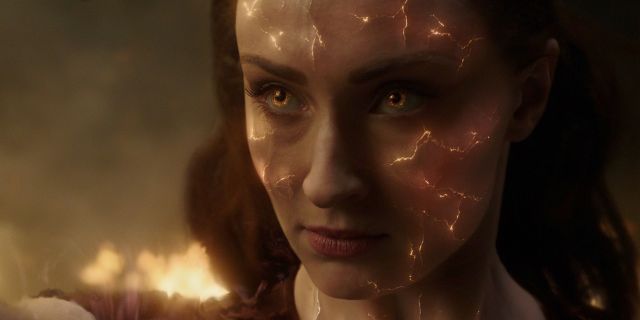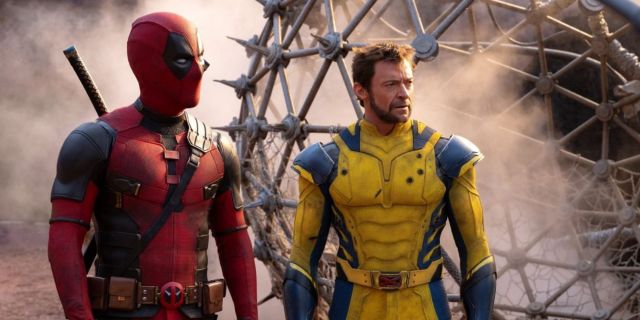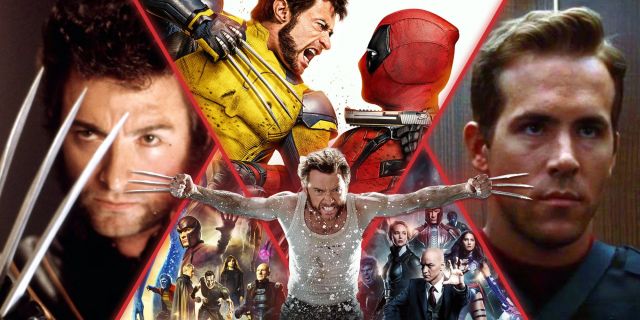Highlights
-
Deadpool & Wolverine
is set to usher in the X-Men era of the MCU and that means managing the nostalgia carefully. - Fox’s X-Universe was undeniably influential and had phenomenal longevity, but it had more lows than highs.
- The Merc with a Mouth has the chance to give the 20-year run of the Fox X-Universe an incredible send-off while the MCU looks to the future.
This year’s film charts will likely be dominated by an era of big-screen X-Men many thought they would never see again. There’s an irony in the MCU staking its big success for 2024 on the Fox-era of Marvel adaptations, but that’s what Deadpool specializes in. Ryan Reynolds’ Merc with the Mouth isn’t just jumping into MCU continuity feet and sword first, but bringing fundamental parts of the Fox era with him, most significantly Hugh Jackman’s Wolverine.
Deadpool & Wolverine is where Marvel Studios supremo Kevin Feige says the X-Men era of the MCU begins, but it’s also where the studio needs to break with the past. Deadpool’s third movie will likely, irreverently, reference the highs and lows of Fox’s two decades of steering Marvel mutants to the screen. But it’s also the overdue chance to draw a line under that nostalgia and follow the source comic books’ lead in embracing a new era. It’s time for the New X-Men.
Beginnings Of X
Fox was an early believer in Marvel properties. During the 1990s, Marvel had a rough patch with plummeting sales and a fast-diminishing readership. Still, that was the decade that saw the X-Men beat everyone else. Chris Claremont and Jim Lee’s X-Men #1 from 1991 remains the best-selling issue of a comic book of all time. Fox jumped on the trend, snapping up the film rights two years later and bringing the mutants to the screen seven years after that.
X-Men (2000) was a well-appreciated film, but it was underpowered. A handful of X-Men and a smattering of Brotherhood of Evil Mutants built to a stand-off at the Statue of Liberty 20 years before the MCU arrived at the landmark. The first X-Men film was missing a set piece or two, but one thing it got right was the casting. Almost a quarter of a century later, Hugh Jackman’s Wolverine is still the definitive image of the Canadian mutant in moviegoers’ minds.
Some Of The Greatest Comic Book Movies Ever Made

Fox’s X-Universe franchise can claim some of the greatest comic books ever made. X2: X-Men United improved on the previous film in every way, with a brilliant plot, stylish action, and a phenomenal cliffhanger that set every comic book fan’s heart racing.
After the original trilogy was completed, 2011’s X-Men: First Class was ahead of its time. Director Matthew Vaughn softly rebooted the franchise by turning the clock back. He made brilliant use of a period setting to find a stylish new direction for the superteam that paid tribute to its 1960s roots despite criticism of its villain. Bryan Singer then returned to the franchise he started to merge the timelines and redeem the conclusion of the original trilogy. It was the perfect moment to adapt Claremont’s classic storyline, Days of Future Past. Once again making brilliant use of time periods — a dystopian future and moody 1970s — it provided the spectacular action X-fans had been waiting for.
Jackman’s Wolverine had spun off from the core movies by this time. The Wolverine (2013) put the mutant back on the map before the post-apocalyptic Logan set a new bar for R-rated, hard-hitting comic book movies in 2017.
As the Fox X-franchise grew, the studio took more risks. The two Deadpool movies wisely took the lead from its fourth-wall-breaking inspiration. It was a game that movie audiences found irresistible and something Disney is now banking on.
Fox successfully carried the franchise onto TV with generally good results, partly because the TV and movie universes were kept separate. The Gifted’s two seasons were a solid attempt to bring the mutant story to the screen, but a particular highlight was the FX series Legion. Showrun by Noah Hawley and starring Dan Stevens and Aubrey Plaza, the experimental show ran for three series while keeping its distance from the wider X-Universe.
The Lows Of The Fox X-Men Universe

Unfortunately, the impressive highs of the Fox X-Universe were more than matched by some underpowered lows.
Reality struck early on when the trilogy closer so brilliantly set up by X2 was badly fumbled. Brett Ratner took the directing reins from Bryan Singer for the disappointing X-Men: The Last Stand. Questionable dialogue, awkward SFX, and an impressively unmenacing Phoenix looked to have sunk the franchise until the prequel cycle took over.
History repeated when First Class continuity went the same way as the original trilogy. Days of Future Past’s peak was followed by Apocalypse. What was touted as a comic book disaster movie of global proportions, this time set in the 1980s, stumbled on bringing its iconic and immensely powerful villain to the screen.
Somehow, the new timeline went one step further than the originals when it concluded Fox’s core movies with Dark Phoenix. As the movies came full circle to the early 1990s, the franchise and its impressive class had lost all the charm, style, and feel for its source material. Dark Phoenix limped into cinemas under the shadow of Disney’s acquisition of Fox and delivered the lowest global box office of any X-film up to that date. That record was smashed soon afterward, but the less said about New Mutants, the better (even though its 36% Rotten Tomatoes score beats Dark Phoenix’s miserable 22%).
Elsewhere, fans may still rave about Logan’s affecting take on the classic comic storyline Old Man Logan, but they are lucky that version of the mutant made it to the screen: The ambitious plan for X-Men origin films fell at the first hurdle with X-Men Origins: Wolverine. It was a vanilla and uninspiring origin for the feral antihero that badly mishandled fan-favorite characters like Deadpool. The subsequent redemption of Wolverine and Deadpool shows how much of Fox’s success came from reacting to its missteps. Marvel Studios may have high hopes for Deadpool & Wolverine, but it needs to break the cycle.
The Future Of X

There is unlimited potential in the X-Men, and the recent success of X-Men 97, which exceeded the original show, suggests Disney is refreshingly open to ideas from the mutant’s past. Marvel Studios can do worse than look back to the comics to unleash the X-Men’s creativity. The Krakoan Age, which dominated comic titles for the past five years under Jonathan Hickman’s guidance, is already considered a modern classic. Reaching back, Cullen Bunn’s X-Men Blue storyline and Grant Morrison’s controversial New X-Men era. Further back, many classic character points remain unused from the groundbreaking run of Chris Claremont, beyond Days of Future Past.
X-Men is packed with more regenerative juice than other classic and malleable comic lines. To Fox’s credit, their X-Universe remained consistent for two decades, unlike Sony’s Spider-Man or WB’s Batman. However, that means audiences have only ever seen variations of that one vision on screen. The Fox era played an undoubted role in the domination of comic book movies and managed to haul over $6 billion over 20 years. But Deadpool’s forthcoming tangles with the Time Variance Authority can do better than reviving the era.
Fans can expect a slew of cameos and references in Deadpool & Wolverine. However, building on the Quicksilver jokes of Wandavision, Professor X’s farewell in Doctor Strange in the Multiverse of Madness, and Beast’s recent cameo in The Marvels’ mid-credit scene, which established the Fox X-Universe as part of the MCU Multiverse, it’s the chance to give that era an epic, and final, send off.











Leave a Reply